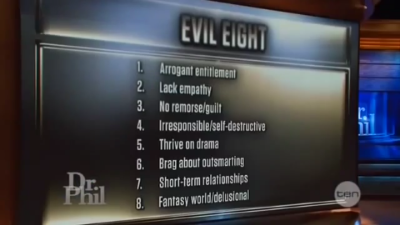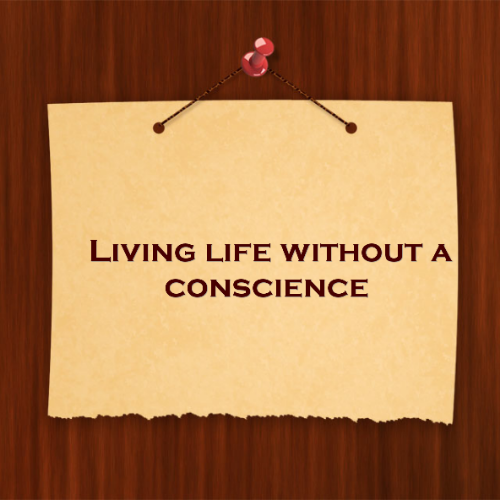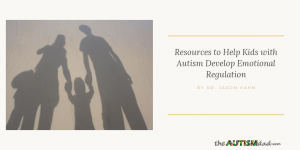This is a sobering reality. Lizze was watching Dr. Phil on her phone this afternoon and apparently the show was about cult leaders and sociopaths. During the show, Dr. Phil had this list up on the screen.
The list is called the Evil Eight.
Basically, there are people that he refers to as BAITER’s. Back stabbers, Abusers, Importers, Takers, Exploiter’s and or Reckless People.
1) Arrogant entitlement
2) Lack empathy
3) No remorse/guilt
4) Irresponsible/self-destructive
5) Thrive on drama
6) Brag about outsmarting
7) Short-term relationships
8) Fantasy world/delusional
There’s way more to the story but this is it in a nutshell.
Here’s what’s interesting. This list describes Gavin to a tee and that’s really disturbing. The only item on the list that’s even remotely questionable is number 7.
Now I’m not sure that this is the de facto way to identify a sociopath but it’s certainly concerning that he scores at least 7/8 on this list. It also goes along with what we’ve already known and suspected.
It doesn’t mean that Gavin is evil. It just means that he’s going to have a rough time making good decisions and decisions that don’t hurt the people around him because he’s incapable of feeling remorse. Without a moral compass to guide him, he’s much more likely to hurt people and do things to get in trouble because he’s living life without a conscience…..
This is why we are trying so desperately to keep him moving along a straight and arrow path. At least as straight and narrow as possible..
This site is managed almost exclusively from my Samsung Galaxy Note 3. Please forgive any typos as auto-correct HATES me. 😉
Update: If you like this post, check out these as well. Click —–> Here <—– for my Top Posts.
Visit the My Autism Help Forums
To reach me via email, please Contact Me





We have two kids with Autism. Depending on how you look at their behaviour, they could tick 7/8 boxes in the list above, too (except the relationship one). HOWEVER, if you frame it differently, that whole list changes.
1) Arrogant entitlement – I guess this depends on how you define “arrogant”. Isn’t this in the eye of the beholder? People with Autism (and yes, I am one of them) can come across as arrogant and feeling entitled – especially when we desperately want/need something (particularly to do with our special interest), and when we’re anxious. We can also come across as that when when we feel strongly that we have been wronged, or that an injustice has been done (especially in terms of what we think should have happened but then didn’t eventuate).
2) Lack empathy – the only person who can decide this is the person themselves. People with Autism can have extreme trouble showing empathy. We often go into “freeze” mode, doing nothing because we’re not sure of what the right thing to do is. Sometimes we laugh when people hurt themselves – again, we may not be sure of the right reaction, forget to look at it from the other person’s perspective (heard of Theory of Mind deficits?), or sometimes we react in ways that we think will make someone feel better, or try to do something that would make us feel better in the same situation, but is actually completely wrong for most people. Case in point: my boss (a Vet, and has Autism) when she has just euthanised someone’s beloved pet and they are weeping all over the place, will cheerfully whip out her phone and say loudly, “Have I shown you the pictures of my new foal?” – she is not lacking empathy, or callous, or self-centred. She is actually trying to help, incredible as this may sound – thinking about her foal makes her feel great, this person is clearly sad, what would cheer them up? Thinking about the aforementioned foal.
3) No remorse/guilt – Again, push us when we’ve had a meltdown, and we will often react as remorseless, guiltless people. We feel awful about what we’ve done, but unless we have been taught otherwise, we think it’s NEVER ok to make a mistake. Mistakes are anathema. So, if you deny you’ve made a mistake, then you haven’t. We need to learn that mistakes are ok, and that saying sorry is ok too. We need to have repair modelled to us – parents, siblings, teachers etc need to apologise to us when they have wronged us. Unfortunately, this is hard to come by.
4) Irresponsible/self-destructive – When we’re in meltdown, we can do completely crazy things – bang our head against the wall, deliberately crash the car (yes, it has happened), drink ourselves into a stupor, pull towel rails off the wall, etc. Yes, they all fit the “irresponsible” and “self destructive” thing to a tee. And they can look deliberate. But they are actually desperate.
5) Thrive on drama – Again, eye of the beholder. One Autistic person’s meltdown due to the demands on them outstripping their ability and skills (emotional, intellectual, executive, etc) to cope with a situation is a neurotypical person’s “drama”.
6) Brag about outsmarting – yeah, well, you know that thing in point 1) about never being wrong, always being right? It’s the same as always needing to be the best, the fastest, top dog, etc and smarter than everyone else. Then, you can’t be wrong.
7) Short-term relationships – I know some people with Autism have trouble keeping friends. We can come across as obsessive and possessive if we don’t know how to conduct relationships. We can be clingy because we have lost friends in the past. We can forget that just because we think about a friend, doesn’t mean they know we are, so they assume we don’t care because we don’t call. I could go on.
8) Fantasy world/delusional – Really?? What is reality, anyway? Reality is the world we build in our heads, and my reality is different to yours. What we learn, what we understand, depends on our perspective, our past experiences. Living in a fantasy world is a brilliant escape from the everyday overload of the neurotypical world.
Finally, I am going to say this: you are LUCKY you live in the US of A (I’m guessing, by your use of “z” instead of “s” in all those word endings :o) LOL). You have access to people like Ross Greene and Kari Dunn Buron. Read Ross Greene’s book “The Explosive Child” – I hope it will help you understand your kids better, and you might find another perspective AND a plan of action for the stuff you are going through at the moment. It has helped us enormously.
Thanks for your blog.
It’s tough to come face to face with something like this. However, I did want to remind you of the times you have mentioned that Gavin did something that demanded empathy: holding the door for someone with packages, leading his smaller brothers into school, etc. Some kids are born with empathy deficits (just like kids are born with physical deficits or autism or other mental health issues), but it’s not all-there or all-gone. Gavin’s road may be long and a lot harder than some other kids’, but that doesn’t mean he won’t get to a good place. Every little bit of scaffolding you build for him to learn and improve his empathy skills, you have made an important contribution. Hang in there.
You raise a really good point. The issue is though that all of those things are likely superficial. Gavin can absolutely do nice things for people and he does.
Most of the time though it feels like he’s doing these things to maintain the appearance of this charming, sweet and loving kid.
It works because he does this with the school and his grandparents. What happens is it makes us look like we’re crazy and it works……
That said, I hope and pray with all that I am, that you’re right… 🙂
Yes, I get that. At times some behaviors may be superficial, or even designed with an audience in mind. But if you can catch that moment and praise it like crazy, you have the chance of helping the child internalize it — and then it could become something they do for a genuine reason. They say that saying “Thank you for doing that. You are such a helping person.” creates that picture of themselves for the child — and they may come to see themselves that way.
I will say one thing that I have learned (my kids are older). There is no parenting prize for being accurate about your kids’ failings. The prizes in parenting go for being able to help your child move from point A (wherever that starting point is) to Point B (somewhere more positive). It may be a prize no one else in the world understands (and they may still judge you because Point B is not Point C yet), but you will have done something great. You can do it. You probably already have.